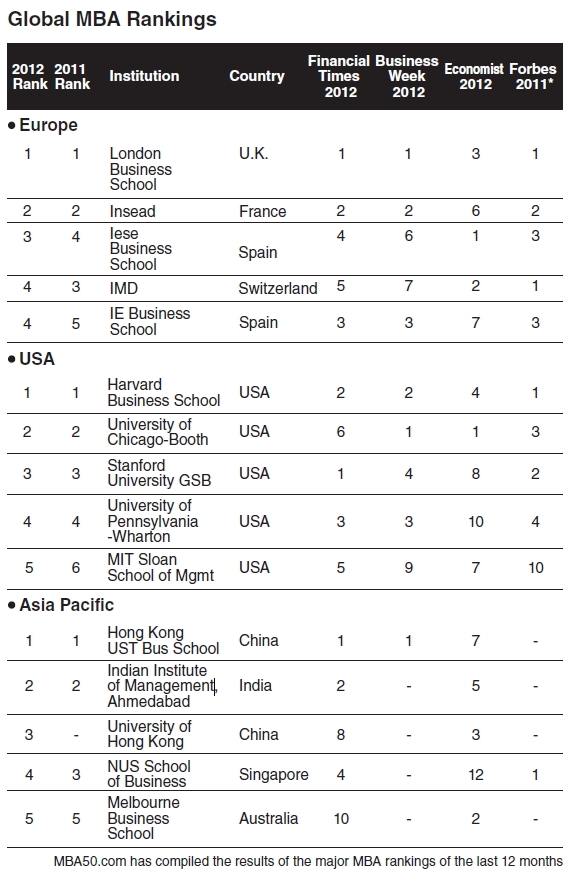For the first time in 2012, Korean business schools featured in two of the major rankings. Sungkyunkwan University’s Graduate School of Business made an impressive entrance at 66th in the Financial Times, while Yonsei University School of Business again featured in The Economist, this year at 83rd.
Critics of the MBA rankings, and there are many of them, point out that they typically only measure what is easy to count ― things like post-MBA salaries, GMAT scores and the percentage of international students and faculty. The over-reliance on self-reported data is also called into question, and the absence of any meaningful indicators for teaching quality, personal development, or the impact of the alumni network.
But what happens when you take all the MBA rankings collectively? The Korea Herald, in association with MBA50.com, has compiled the results of the big five MBA rankings to produce a Ranking of Rankings, the MBA50 Premiership 2012 (www.mba50.com).
Business schools are separated schools into four regions ― U.S., Europe, Asia-Pacific and Canada ― to account for the fact that only the FT and The Economist make direct international comparisons. Overall performance is calculated by looking at the ranking position within each region, and taking an average of those results based on the number of rankings in which the schools appear.
In Europe, London Business School maintains the top spot, with an impressive 12-month performance that sees it as the No. 1 European Business School in three of the major rankings. IESE Business School climbed into the top three following the school’s strong performance in both the BusinessWeek and The Economist rankings, with France’s HEC Paris also rising at the expense of Spain’s Esade.
In the U.S., the four top places continue to be dominated by Harvard Business School, Chicago Booth, Stanford GSB and The Wharton School.
In the Asia-Pacific, schools from Hong Kong and mainland China fill three of the top five places, while in Canada, the big winners this year are York University’s Schulich and McGill’s Desautels Faculty of Management.
But as McGill-Desautels dean Peter Todd explains, there is no “best” business school in the world, but there may be a best business school for each individual.
So how much should we read into these 2012 media rankings? The Economist admits that comparing “a one-year Danish program with a cohort of 50 students with a two-year American one with 1,000 is tricky. Some would say futile.”
Each ranking uses a different methodology and weighs the use of different data to produce their league tables, so it is important for candidates to understand what is being measured.
For HEC Paris associate dean Bernard Garrette, the reality is that very little separates the top business schools as measured by the data used for the rankings. But he points out that there is a tremendous difference in terms of the student experience that rankings simply cannot capture.
“A world-class MBA should be a transformational experience, so it is far more important to choose a program that corresponds to the personality and objectives of the individual. Nothing will replace interacting with the school and its students and alumni to determine whether the MBA offers the right fit.”
By Matt Symonds
Matt Symonds is the chief editor of MBA50.com. The MBA50.com is a website dedicated to the world’s outstanding business schools. ― Ed.

-
Articles by Korea Herald



![[Exclusive] Korean military set to ban iPhones over 'security' concerns](http://res.heraldm.com/phpwas/restmb_idxmake.php?idx=644&simg=/content/image/2024/04/23/20240423050599_0.jpg&u=20240423183955)

![[Graphic News] 77% of young Koreans still financially dependent](http://res.heraldm.com/phpwas/restmb_idxmake.php?idx=644&simg=/content/image/2024/04/22/20240422050762_0.gif&u=)



![[Pressure points] Leggings in public: Fashion statement or social faux pas?](http://res.heraldm.com/phpwas/restmb_idxmake.php?idx=644&simg=/content/image/2024/04/23/20240423050669_0.jpg&u=)










